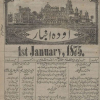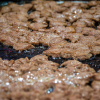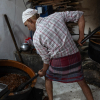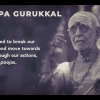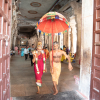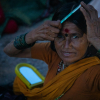I was last in Pakistan in 2006 during Ramzan. Rahul had some work in Islamabad, Peshawar and Lahore and I had used that as an excuse to visit my mother’s place of birth. While I have visited my mother’s beloved Lahore a few times earlier this was to be my first trip to Islamabad and Peshawar.
To cut a long story short, on our first evening in Peshawar, post iftaar, we found ourselves in the fabled Qissa Khwani bazaar, the Bazaar of Story tellers. It was here that in 1930 Indian soldiers of the Garhwal Rifles in the colonial army had refused to fire on non-violent, unarmed nationalist protestors led by Badshah Khan’s Khudai Khidmatgars. History has come a long way since then marking contemporary Peshawar as one of the more violence prone cities of Pakistan.
That evening the bazaar if not exactly deserted was quite thinly crowded much to my disappointment. I had expected Ramzan evenings like elsewhere in South Asia to be bustling with gaiety and people on Peshawar streets. Evidently between the Americans and Mullahs the streets of Peshawar find it safer being somber. Worse, there was no other woman in sight. Feeling horribly conspicuous I tried to pretend it didn’t matter. I kept reminding myself that we were not exactly spoilt for choices as far as ‘doing something’ in Peshawar went. Unlike Islamabad and Lahore where we had a plethora of friends inviting us to their homes every evening for dinner or taking us out we knew no one personally in Peshawar. And so we had to spend the evenings on our own. And trudging the rather desultory and deserted lanes of Qissa Khwani Bazaar was as good a pastime as any. The evident anxiety of Rafiq, our local driver, who requested us to keep within safe sighting distance in the bazaar had added a dose of excitement to what otherwise portended to be a dull evening.
Girls celebrating Eid in Peshavar,
courtesy: Ahramonline
After shopping for the mandatory Peshawari sandals we began looking around for an eating place we could buy food to take back to the guest house. Rahul wanted to search for the famous Charsi kababs, the name derived from the marijuana that is supposedly part of the kabab marinade. I frankly would have rather preferred returning to the tasteless meals our guest house specialized in rather than wandering the streets of Peshawar and imagining a hundred eyes censoriously following my every move. But then it was not everyday one came to Peshawar or had a chance to partake Charsi kababs. So reminding myself that my anxiety was largely in my head I joined the search with as much enthusiasm as I could muster.
We didn’t have to wander for long. Everyone knew the ‘one and only, world famous Charsi kabab’ restaurant in the bazaar and we soon found ourselves inside a huge eating place that had a floor based dastarkhwan arrangement. Unlike the streets outside the restaurant was thronging with people who seemed to be having quite a cheery time. Except that all the people were men and their happy spirits and bleary eyes and sprawled out ease spoke of copious ingestion of marijuana that certainly couldn’t have come only from the kababs. The reassuring part of this jolliness however was that no one seemed remotely interested in us. But I still felt unwanted and ill at ease and wished to be out of the restaurant as soon as our order got placed and served.
Mindful of my status as the only woman guest in their establishment, the restaurant waiters ushered us to the splendid isolation of the western style dining space on the first floor. Its walls plastered with bathroom tiles, the vast interiors of the hall were lined with plastic tables and chairs of which we were the sole occupants. Breathing a sigh of relief I waited for someone to come and take our order. This proved rather more complicated than we had imagined since the waiter, when he arrived insisted on speaking to us only in Pashto in response to our Urdu. We had experienced this politics of language earlier in the day in Peshawar bazaars where we would be mistaken for Urdu speaking Pakistanis from Lahore or more usually, Karachi. The way out, we had been advised by Rafiq was to quickly announce that we were from India. This had usually worked through the day. The Pashto would give way to Urdu, sometimes halting, usually pretty fluent. We therefore did the same with the restaurant waiter but with little effect. He continued speaking in Pashto and we were left none the wiser if he had actually understood our order or the instructions for it to be packed.
Once he left we waited in tense silence for our packet of food to materialize. After some time our silence gave way to whispers and in a while the whispers dissolved into a normal conversation. The tension too ebbed. The restaurant with its South Asian aesthetic kitsch began transforming over the passage of time into a familiar, pleasant space. The fact that we were alone helped of course. We now wished we had not asked for our order to be packed and instead had opted to eat here. By then our waiter returned accompanied with another, both carrying food in dishes ready to be served.
Guessing that the waiter had misunderstood our instructions for food to be packed we happily requested him to bring the tray to our table. While he and his companion quietly laid out the food before us, we noted with some surprise that it was not quite the dinner that we thought we had ordered. The kababs had come in a tiny portion to the large we had asked for. Additionally there was chicken in thin tomato based gravy that we had not ordered. And there were the mandatory naans. Putting the mix up in the ordering at the doorsteps of miscommunication we decided to go along with the food in front of us. It looked rather nice and besides all the waiting had left us ravenously hungry.
We did full justice to our unspectacular but nonetheless very satisfying dinner. The kababs were soft and succulent though a bit bland for our spice doused taste buds. As was the chicken. Dinner done we waited for the bill. A long time passed. When no one appeared we made our way to the ground floor to pay up directly at the counter. Our bill was ready as was the packed food we had ordered.
A bit perplexed we explained that we had already eaten our dinner and therefore this package must belong to someone else. No, we were told. The packed kababs and naan were the ones we had ordered. The food we had eaten was actually the waiters’ dinner. But why didn’t they say so when we asked them to serve it to us, Rahul asked astounded. You are our guests from India. How can we refuse you the food you wish to eat, came the grave reply. The bill we noticed was only for the packed food we had ordered. The dinner we had eaten was on the house. Feeling foolish, embarrassed and overwhelmed we insisted on paying for that too. The manager refused to even hear us out on this. We were their guests, he repeated while firmly placing the packed food in Rahul’s hands. We noticed our waiter along with his friend emerge from the kitchen with what must have been their dinner. Raising his hand in salute he smiled at us. Murmuring thanks and goodbyes we made our way out in the by now deserted streets of Qissa Khwani bazaar.
